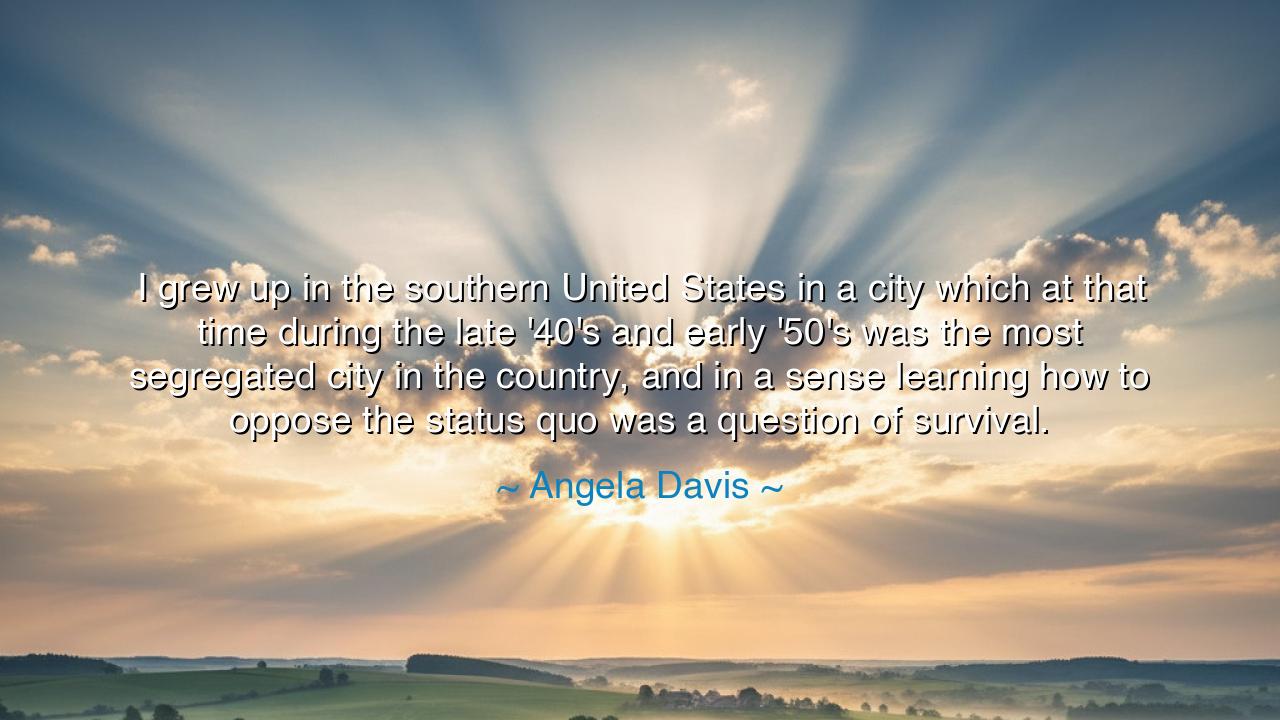
I grew up in the southern United States in a city which at that
I grew up in the southern United States in a city which at that time during the late '40's and early '50's was the most segregated city in the country, and in a sense learning how to oppose the status quo was a question of survival.






When Angela Davis said, “I grew up in the southern United States in a city which at that time during the late '40s and early '50s was the most segregated city in the country, and in a sense learning how to oppose the status quo was a question of survival,” she was not merely recalling her youth — she was bearing witness to a crucible that shaped her spirit. These words are both memory and revelation. They tell of a childhood lived in a land divided by color, in a time when segregation was law and hatred was ordinary. But more deeply, they reveal that resistance — the courage to stand against injustice — is not born of comfort, but of necessity. For some, opposition is a choice; for others, like Davis, it is the only way to live with dignity.
Angela Davis was born in Birmingham, Alabama, a city once called “Bombingham” for the relentless bombings of Black homes and churches by white supremacists. In that cauldron of oppression, she learned that silence was not safety, that to survive, one had to think, to question, to defy the status quo. Her words speak to this truth: that for those who live under systems of injustice, awareness itself is an act of resistance. Every child who learns to question the rules of a corrupt world begins to break its chains. Thus, Davis’s life began as a lesson in survival — survival not of the body alone, but of the soul, the mind that refuses to bow.
Throughout history, the oppressed have often been forced to learn this same lesson. In ancient times, the slaves of Rome who followed Spartacus into rebellion did not seek glory, but freedom. In the fields of the American South, enslaved Africans learned to sing songs of sorrow that carried hidden messages of escape — melodies of hope disguised as hymns. Like Davis, they too understood that to oppose injustice was to stay alive in spirit. The same fire burned in the hearts of those who marched in the streets of Birmingham a century later, facing dogs and hoses with songs on their lips. Their defiance was not born of anger alone, but of love — love for a justice that had not yet come but that they believed in with all their being.
Angela Davis’s journey, however, goes beyond protest; it is a story of transformation through education. She became a scholar and philosopher, studying in the traditions of Marx, Hegel, and Sartre, using the mind as a weapon of liberation. She understood that to change the world, one must first understand it. Her quote reveals that learning itself becomes resistance when the world tries to deny your humanity. The child who grows up in oppression learns to think differently, to see through the lies of power. Knowledge becomes armor; thought becomes rebellion. In this way, Davis’s survival was not passive endurance, but active awakening — a constant questioning of what others dared not ask.
Her struggle mirrors the timeless truth that the status quo, when rooted in injustice, can never be accepted as normal. To “oppose the status quo” is to choose truth over comfort, courage over conformity. Every era has its oppressions, every generation its silent injustices. Whether it be racial segregation, gender inequality, or economic exploitation, the challenge remains the same: will we survive by submission, or by resistance? Davis teaches that true survival demands rebellion — not the rebellion of violence, but of conscience, intellect, and collective solidarity.
We can see echoes of her wisdom in the life of Nelson Mandela, who spent twenty-seven years in prison under apartheid and yet emerged with his humanity intact. Like Davis, Mandela understood that resistance is not hatred, but hope disciplined. It is the art of remaining human in the face of inhumanity. Both he and Davis teach us that the greatest triumph over oppression is not revenge, but the unbroken will to stand upright in a world that demands your silence.
And so, the lesson from Angela Davis is this: never accept injustice as natural, no matter how deeply it is woven into the fabric of society. Teach yourself and others to see beyond the surface — to question, to challenge, to think freely. For learning and resisting are not separate acts; they are one and the same. To think critically is to strike at the roots of tyranny. To speak truth, even when trembling, is to declare that your spirit cannot be enslaved.
Let these words live within you like a torch: “Learning how to oppose the status quo was a question of survival.” When the world grows complacent in cruelty, remember this. When the system demands obedience, remember this. For to oppose injustice — in your heart, your words, your actions — is to keep the sacred flame of humanity alive. And as long as that flame burns, no empire of hatred, no structure of fear, can ever truly conquer the human soul.






AAdministratorAdministrator
Welcome, honored guests. Please leave a comment, we will respond soon